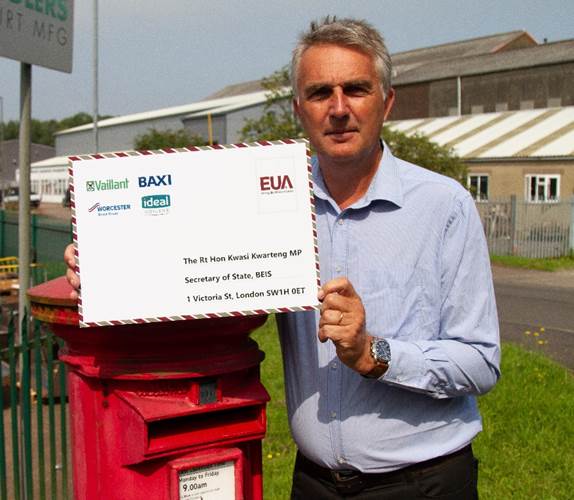
Heating equipment manufacturer Baxi Commercial is partnering with the hotel and hospitality chain Whitbread on a ground-breaking trial of fuel cell technology.
The two-year trial is seen as a vital step towards the wider adoption of fuel cells in the UK commercial heating industry. It is also the first UK-based trial under the European Union’s Ene.field scheme, which is contributing 40% of the costs. Baxi and Whitbread are jointly funding the rest.
The Gamma Premio fuel cell, built in Germany at the headquarters of Baxi Innotech, is one of the first two appliances to be trialled under the Ene.field programme, which will eventually monitor 1,000 installations across the whole of Europe.
The unit was installed in Whitbread’s Glastonbury Premier Inn this summer shortly after the world famous music festival. The project also had to wait for the BBC, who occupied the whole hotel during the festival, to move out.
The hotel opened at the start of 2013 and is heavily occupied throughout the year so was seen as offering ideal trial conditions. It has very high hot water demand – particularly in the morning and evening – amounting to around 3,000 litres per day.
Whitbread is the UK’s largest hospitality company with 40,000 employees. Apart from Premier Inn, it also owns Costa, Beefeater and Brewers Fayre. The group’s management are keen to investigate new technologies capable of reducing running costs and carbon emissions associated with hot water production across its very large estate.
It is already working closely with Baxi Commercial on the development of combined heat and power (CHP) solutions and Baxi engineers have just completed a full survey of the heating and hot water arrangements at all of Whitbread’s 650 premises.
The fuel cell works by extracting hydrogen from the natural gas supply and converting it into water, heat and steam all of which can be used to produce heat and electricity in a process that is almost 96% efficient and reduces the amount of fossil fuel needed to power the heating plant.
At Glastonbury the Baxi unit was installed between the cold mains supply and two existing Andrews Maxxflo condensing water heaters together with two buffer vessels. This arrangement means the fuel cell will provide approximately 20% of the total hot water demand of this busy hotel – around 700 litres per day.
The system has been configured to allow the fuel cell to run 24 hours a day, which will maximise its efficiency. It has its own 300-litre storage cylinder, which is heated first, before it moves on to supply the main system’s 500-litre pre-heat cylinder at 60degC. The ‘free’ electricity produced is used within the plant room to run pumps and other ancillary units further reducing the carbon footprint of the building.
Four engineers from Baxi Innotech travelled over from Germany to help with the commissioning of the system, which has now been running for three months showing very promising results.
Pre-commissioning analysis of the hotel and its hot water usage patterns, along with the first three months operating figures, have led Baxi and Whitbread’s energy team to predict overall savings of £16,890 over a ten year operating period with CO2 emissions likely to be reduced by 5.8 tonnes per annum.
Heat meters have been installed on the mains and water supply and a gas meter is also continually recording the level of fuel consumption. The electricity generation is also being recorded and contributes to the carbon reduction results.
The metering enables engineers to make very accurate recordings and also analyse parasitic losses in the secondary return so they can build up a more comprehensive picture of the overall performance. Engineers at Baxi Innotech are continually monitoring the installation via a built-in internet link from their laboratory in Hamburg. As well as closely analysing the performance, this also allows them to alert Baxi’s service team in the UK to any potential maintenance issues.
The Maxxflo water heaters and the fuel cell are being independently metered to allow the Whitbread team to make meaningful comparisons. The heat output from the fuel cell itself is directly recorded via a heat meter installed on the outlet from the 300-litre buffer vessel that monitors the temperature difference between the flow out of the buffer vessel and the return to the fuel cell.
A second heat meter is also installed on the secondary DHW flow and return reporting the system losses from the secondary circuit which allows the Innotech engineers to calculate the total system efficiency. A third heat meter measures the total energy needed to raise the cold feed to the DHW outlet so that the total energy used can be recorded. The electricity produced by the fuel cell is also being measured.
At the end of the two-year trial the fuel cell and buffer vessel will be de-commissioned and returned to Baxi Innotech for evaluation. The original 500-litre storage vessel will remain in place. Whitbread can then decide if they want to proceed with a permanent fuel cell installation or to replace it with another renewable technology.
“We see a really promising future for this technology,” said Chris George, energy and environment manager for Whitbread. “The results so far are very encouraging. This trial will allow us to make informed decisions based on our own experience in a fully operational hotel, which is so much more valuable than lab-based testing.
“CHP supplied by Baxi Commercial is already playing a key role in our low carbon energy strategy and we are very hopeful that fuel cells will also have a place in the future.”
Mitesh Panikker, supply chain manager at Whitbread, adds: “We really value our close and longstanding relationship with Baxi Commercial as it has allowed us to develop a deeper understanding of emerging technologies and their potential.
“Baxi Commercial possesses the values that we look for in all of our suppliers. As well as being able to offer us a high level of advice and support, Baxi Commercial has innovation at the forefront of everything it does and is able to provide us with cutting-edge technology, helping us in our commitment to reduce our environmental impact and reach our ambitious sustainable goals.”
Baxi Commercial’s business development manager Neville Small comments that site-based trials also allowed the company’s engineers to iron out any practical, operational issues.
“We are extremely grateful to Whitbread for allowing us such open access to their premises. This means we can closely monitor the equipment and fine tune its performance to suit actual demand,” he said. “The future for fuel cells is bright and we are delighted to be at the forefront of this important technological advance.”










